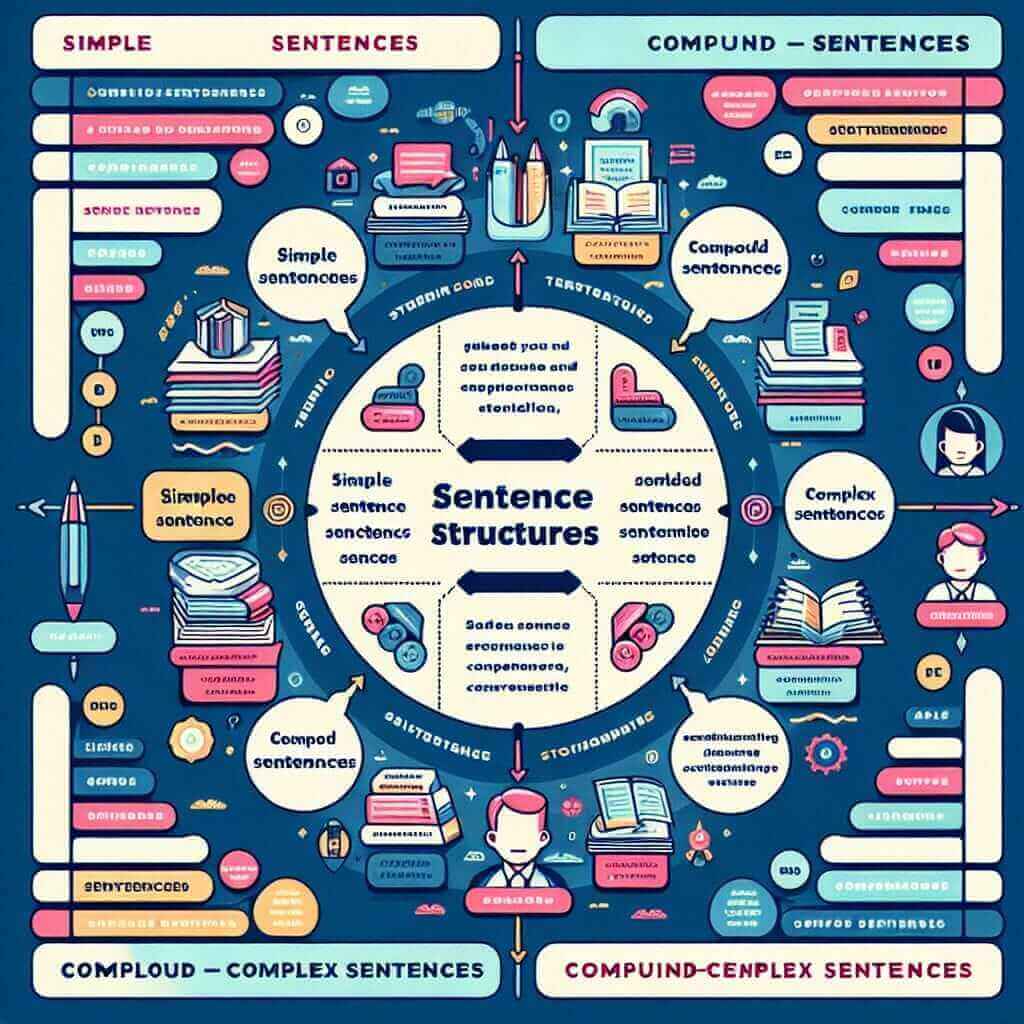Mastering sentence structure is crucial for achieving a high score in the IELTS exam, particularly in the Writing and Speaking sections. A strong grasp of English grammar not only makes your writing clearer and more impactful but also demonstrates your language proficiency to the examiner. This article provides a comprehensive guide on how to enhance your sentence structure for IELTS success.
Understanding Sentence Structure
Sentence structure refers to the way words and phrases are arranged to form grammatically correct and meaningful sentences. It involves understanding:
- Word Order: English follows a Subject-Verb-Object (SVO) order in most cases.
- Clauses: A group of words containing a subject and a verb. There are independent clauses (can stand alone) and dependent clauses (cannot stand alone).
- Sentence Types: Simple, compound, complex, and compound-complex sentences.
Common Sentence Structure Errors in IELTS
- Sentence Fragments: Incomplete sentences lacking a subject or verb.
Example: Although I enjoy traveling. (Incorrect)
Improved: Although I enjoy traveling, I haven’t been abroad recently. - Run-on Sentences: Two or more independent clauses joined incorrectly.
Example: The weather was beautiful we went for a walk. (Incorrect)
Improved: The weather was beautiful, so we went for a walk. - Choppy Sentences: Overuse of short, simple sentences.
Example: I went to the store. I bought some milk. I came home.
Improved: After going to the store to buy some milk, I returned home. - Incorrect Verb Tense: Using the wrong tense can create confusion and affect meaning.
Example: I am living in London for two years. (Incorrect)
Improved: I have been living in London for two years.

Techniques to Improve Sentence Structure
1. Vary Sentence Length and Type
- Combine Short Sentences: Use conjunctions (and, but, or, so, because, etc.) to combine simple sentences into compound or complex sentences.
- Use Relative Clauses: Add information and complexity with “who,” “which,” “that.”
Example: The book, which was written by a famous author, was very interesting. - Employ Participial Phrases: Use verbs ending in “-ing” or “-ed” to add description.
Example: Feeling tired, I decided to take a nap.
2. Use a Variety of Grammatical Structures
- Conditional Sentences: Express possibilities and hypothetical situations.
Example: If I had more time, I would travel the world. - Passive Voice: Shift the focus from the doer to the action.
Example: The report was written by the marketing team. - Inversions: Start sentences with negative adverbs or phrases for emphasis.
Example: Never have I seen such a beautiful sunset.
3. Use Transition Words and Phrases
- To Show Addition: Furthermore, moreover, in addition, also.
- To Show Contrast: However, on the other hand, nevertheless, despite.
- To Indicate Cause and Effect: As a result, therefore, consequently, due to.
Applying Sentence Structure to IELTS
Writing Task 2
Example Topic: Some people believe that the best way to improve public health is by increasing the price of unhealthy food. To what extent do you agree or disagree?
Weak Sentence: Many people eat unhealthy food. It is cheap. (Choppy, simple sentences)
Stronger Sentence: One reason for the prevalence of unhealthy eating habits is the affordability of processed food, which often undercuts the cost of healthier alternatives. (Complex sentence with varied vocabulary)
Speaking Part 3
Examiner: What are the benefits of learning a foreign language?
Weak Response: Learning a new language good for your brain. It can help you get a better job. (Simple sentences, informal language)
Stronger Response: Acquiring a foreign language offers numerous cognitive advantages, such as enhanced memory and problem-solving skills. Moreover, it can significantly boost one’s career prospects in today’s globalized world. (Complex sentences, formal language, transition words)
Practice and Feedback are Key
- Regularly write essays and practice speaking topics: Focus on using a variety of sentence structures.
- Get feedback from a teacher or tutor: Identify areas for improvement and work on specific weaknesses.
- Analyze high-scoring IELTS sample answers: Pay attention to how sentences are constructed and use them as models for your own writing and speaking.
By consciously working on your sentence structure, you’ll not only improve your IELTS score but also enhance your overall English fluency and clarity. Remember, consistent effort and targeted practice are the keys to success!